商务英语阅读写作Unit 1
Unit 1(商务英语阅读教程1)
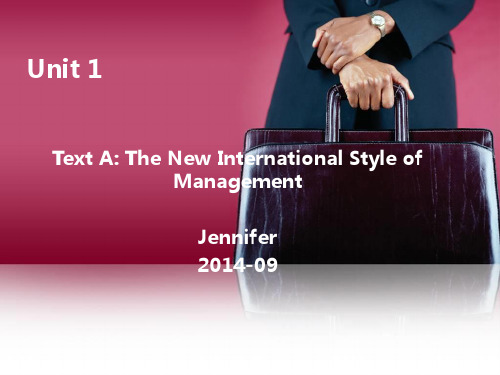
Homework
1.Summarize the main idea of the the Supplementary Reading on P9 with no more than 50 words. 2.Finish P10 Part V Test Yourself
Note on the Text
1. Enrolling in college is one step toward fulfilling our vision of the future.进入大学是完成将来梦想的第一步。 enroll in:登记入学,入伍,入会等。 如: It's too late to enroll in that class.现在报名进那个班太晚了。 2. Goal-setting involves developing a list of things you would like to achieve in your personal or professional lives-your goals. 设立目标包括列出一些你在个人生活和职业生活中想要完成的事情—— 即你的目标。 3. Understanding what success means to you and the level of success you are willing to accept in life is one of the first stages of new venture planning. 理解成功对你的意义和生活中你想获得的成功水平是计划新事业的第一 步。
Homework
1. If each country’s business had a national style or personality, what would the Chinese business personality be? Discuss how business in China typically operates. 2. Discuss the last time you had to strike a balance in order to reach an agreement about something? 3. Report on the similarities and differences in management of the multinationals (IKEA, TESCO, Walmart, P&G, etc.) in China. 4. Read Text B
商务英语阅读-unit-1-What's-the-business-for

1937年麦当劳兄弟(理查.麦当劳 Richard McDonald, 莫里森.麦当劳 Maurice McDonald)在洛杉机东部开始 经营当时美国极其流行的汽车餐厅。
Kroc其实是一个推销员。当他高二辍学后,便开设了一家音乐 社,将他在钢琴上的才华诸于商业。第一次世界大战爆发后, 他渴望到外国去,所以虚报了年龄,成为红十字救护车驾驶员。 战后,他将弹琴与销售二种技巧合而为一。25岁后以及接下来 的25年中,克罗克一直从事推销工作。克罗克1954年7月第一 次与麦当劳兄弟见面,便决定加入其中。
Activity 8 (p.7)
Paragraph 1
c
Paragraph 2
d
Paragraph 3
b
Paragraph 4
a
Second reading---Read the text with these questions
1. What did “business” mean traditionally?
1.f 2. g 3. a 4. f 5. f 6. e 7. h 8. h 9. c
Activity 1 buying
market
goods
selling
business
company
product
fair
businessman
Have you ever heard of them?
1
2
Bill Gates Henry Ford
1955
1863-1947
Microsoft Corporation
•1992 - What You Want is What You Get
•1988- Good Time, Great Taste, That's Why This is My Place
商务英语写作Unit 1 An Overview of Business Letter Writing[精]
![商务英语写作Unit 1 An Overview of Business Letter Writing[精]](https://img.taocdn.com/s3/m/46a35798c8d376eeaeaa31fe.png)
related values in areas such as integrity, service, and safety to ensure that
there is
Concreteness
• Your writing should be vivid, specific and
definite rather than vague, general and abstract, especially when you are requiring a response, solving problems, making an offer or acceptance, etc.
• They have a
decided advantage in regard to freight charges
• Messrs. Smith and
Richardson have been informed that they would receive an answer in a few days.
shipment.
to 10 tea-sets in
shipment was found.
We/I attitude
You attitude
1. A large sale of our
products will make our company more profitable.
2. We are in need of fund
• This letter is to inform • Since you are our
商务英语阅读(基础篇) Unit 1 Intercultural Communication

I. Reading Practice
Text A
On the other hand, once a given agreement is made, it is the Japanese who sometimes wonder at the slow pace in which Westerners implement the decision. The Japanese are eager to move forward and Westerners, perhaps, lag behind as they take the time for in-depth planning.
A second characteristic is based on “consensus opinion” and “bottom-up direction”. In Japan great consideration is given to the thoughts and opinions of everyone at all levels. This is true of both private enterprises and government ministries. In Japan there is a drive for unity within the group— whether it is family, company, or Parliament.
I. Reading Practice
Text A
In Japan, the most important thing is what organization you work for. This is of extreme importance when trying to analyze the direction-taking or decision-making process. At the least, it explains the greater job stability in Japan, in contrast to the great job mobility in America.
商务英语阅读1 Unit 1
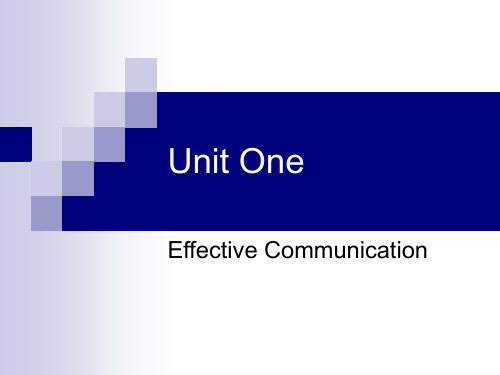
Part II:Voice of Courage
I Background knowledge 1. Know abt
Franklin D. Roosevelt
Franklin D. Roosevelt(1882–1945), 32nd President of the United States, commonly known as FDR who served as the 32nd President of the United States from 1933 until his death in 1945.
A Democrat, he won a record four presidential elections and emerged as a central figure in world events during the mid-20th century.
He directed the United States government during most of the Great Depression and World War II.
Although its causes are still uncertain and controversial, the net effect was a sudden and general loss of confidence in the economic future.
What 's the function of Roosevelt talk?
As a dominant leader of his party, he built the New Deal Coalition, realigning American politics into the Fifth Party System and defining American liberalism throughout the middle third of the 20th century. He is often rated by scholars as one of the three greatest U.S. Presidents, along with George Washington and Abraham Lincoln.
商务英语阅读_Unit 1_办公室基础交流英语
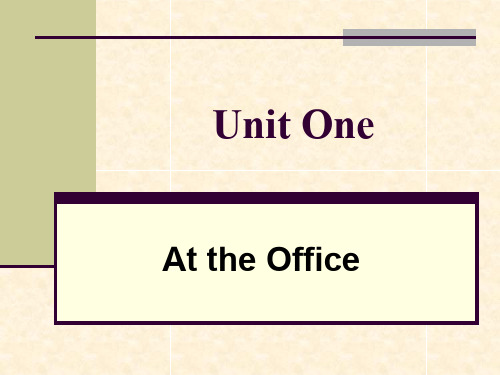
The secre’s central role requires reliability and dependability. If secretaries suddenly become ill each time the going gets rough or the workload becomes unmanageable, you are allowed to ask whether that illness is real or merely psychosomatic and a symptom of an underlying deeper problem, i.e. the secretary’s inability or unwillingness to cope and to face reality, resorting to defense mechanisms instead.
As a bridge, does your secretary smooth ruffled feathers and pour oil on troubled waters? You have a right to expect that he or she does not contribute to a threatening storm in the office. In other words, secretaries need to learn to help solve problem, not contribute to creating them. They must be ever vigilant against displays of temper or frazzlement when the chips are down, lest you and your managerial colleagues begin to question their maturity and self-control.
实用商务英语写作教程Unit1Resume(简历)
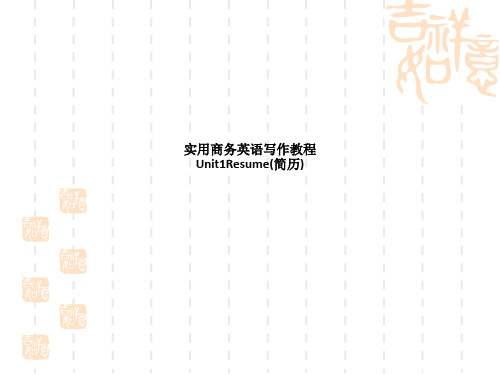
REFERENCES: Mr. Gao Hong (General Manager of the Beijing Huafeng Stock Co. Ltd.) 23 Hepingmenwai Beijing, 100009 Tel: (010) 7463-6352 Mrs. Lin Bing (Dean of the Economics Department of Hebei University) 45 Changjiang Avenue Shijiazhuang Tel: (0311) 836-2726
information Ⅲ) Write resumes according to requirements
General Introduction
▪ 1) What is a resume? ▪ 2) Functions of a Resume ▪ 3) Contents of a Resume ▪ 4) Principles for Writing a Resume ▪ 5) Layout of a Resume ▪ 6) Types of Resume
Computer:
Working knowledge of operation and support of hardware
Good at such software as Office, Photoshop, AutoCAD
Mastery of BASIC, FORTRAN and C++ programming skills
Bookkeeper
Minjiang Company Chengdu, Summer, 1998
Entered variety of data into books Tutor 1997-1998
商务英语阅读第一单元
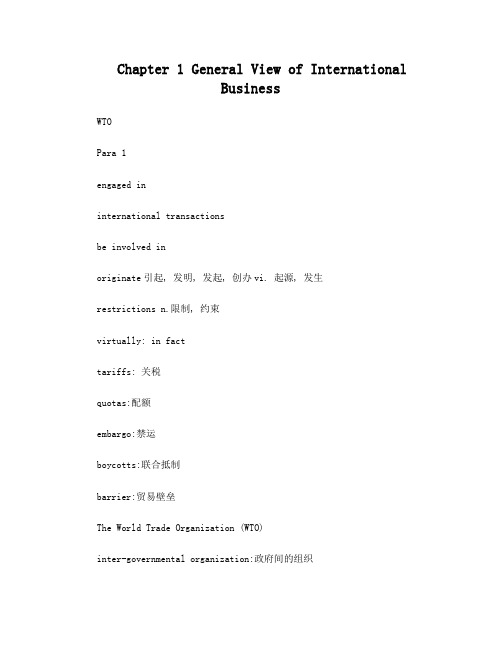
Chapter 1 General View of InternationalBusinessWTOPara 1engaged ininternational transactionsbe involved inoriginate引起, 发明, 发起, 创办vi. 起源, 发生restrictions n.限制, 约束virtually: in facttariffs: 关税quotas:配额embargo:禁运boycotts:联合抵制barrier:贸易壁垒The World Trade Organization (WTO)inter-governmental organization:政府间的组织flow:流畅(be) based on:以……为基础services:服务settle:解决;平息trade dispute:贸易争端negotiation:谈判promote cooperation:促进合作joint decision-making:共同决策consensus:一致同意;一致意见body:机构;团体council:决策班子;委员会committee:委员会consist of:由…组成entire membership:全体成员administrative support:行政支撑secretariat:秘书处Geneva, Switzerland:瑞士的日内瓦Para. 2trading system:贸易系统date back:追溯到…Bretton Woods: 布雷顿森林conference:会议delegate:代表conceive:构思create:创立;创建the World Bank:世界银行the International Monetary Fund:国际货币基金组织1International trade organization (ITO):国际贸易组织a specialized agency:个别机构charter:宪章ambitious:有抱负的;有雄心壮志的extend beyond:扩充;延伸world trade disciplines:世界贸易原则commodity agreement:国际商品协定restrictive business practices:限制性经营办法international investment:国际投资Havana:哈瓦拉(古巴首都)Cuba:古巴ratification:批准legislation:立法opposition:反对the U.S. Senate:美国上议院driving forces:动力announce:宣布seek:寻求congressional ratification:国会的批准effectively:有效地eventual result:最后的结果subsequent:随后的;后来的creation:创建;创立the General Agreement on Tariffs and Trade (GATT):关贸总协定be concerned with:关注…primarily:主要的(mainly)reduce barriers to the international trade of goods:减少国际商品贸易壁垒result from:由…所产生provisional: 临时的prosperous:兴旺发达的multilateral:多边的;多国的international commerce:国际贸易overhaul:彻底改革due:应得的;预期的massive modification:巨大的改革Uruguay Round:乌拉圭回合(在乌拉圭的多次国际贸易谈判) Para 3regulate:控制;调节;规范regulating world trade of goods:规范国际商品贸易tariff barriers:关税壁垒non-tariff barriers:非关税壁垒not long after:soongive birth to: 产生(result in…)de facto: 实际上;实事上informally:非正式的over the years:during the following years evolve: 发展;进化set out:订立conduct international trade:进行国际贸易institution:机构temporary:暂时的;临时的recognize:认可replace:代替amend:修改incorporate:合并live on:继续存在updated:最新的text:版本(version)key principles: 主要原则adopt:采用General Agreement on Trade in Services (GATS):服务贸易总协定intellectual property: 知识产权Trade-Related Aspects of International Property Rights (TRIPS):与贸易有关的知识产权协定Para 4signatory (signatories):签署各国intend:打算set up a worldwide trading organization:建立世界贸易组织in the event:最后(eventually)reach an understanding: 达成一致意见(not) increase tariffs beyond their existing level:增加的关税不超过现在的水平Abolition:废除most favored nation:最惠国trading privileges:贸易特权extend:扩展;延伸systems of preferences:优惠系统;特惠系统Commonwealth Preference:英联邦关税特惠制trading blocs:贸易集团establishment:建立common-market type agreements:共同市场协定EC:abbr. 欧共体(European Community)Outward -looking:外向型的Insular:adj.内向型的;海岛的, 孤立的, 超然物外的abolish quotas:废除配额Kennedy Round:肯尼迪回合account for about 80% of international trade:占….. Para. 5emphasis: 重点;强调shift:转换;转移the north-south dialogue:南北对话conduct:进行;实行the United Nations Conference on Trade and Development (UNCTAD):联合国贸易与发展会议primary commodities:初级商品discriminate (against):歧视protectionist policy:贸易保护主义政策freer access to markets:更自由进入市场的机会WTO Agreements:世贸协定Part 1expansion:扩充governing:控制;调节cover:包括global exchange of goods:全球商品交易capital:资本multi-national organization:多国贸易(be) capable of:能….resolve: 解决trade conflicts:贸易冲突;贸易争端play a key role:发挥关键性的作用settle trade disputes:解决贸易争端at its heart:起核心作用legal:法定的ground-rules:章程essentially:本质上bind governments to keep their trade policies:约束各国政府保持贸易政策不变within agreed limits:已经过协议的范围内as negotiated and signed governments:作为经过谈判和签署协议的各国政府objective:目标;目的achieve:实现tolerance:宽容generosity:大度impartial means of settling trade disputes:公正解决贸易争端的办法overriding purpose:最重要的目的undesirable side effects:不希望发生的副作用obstacles:障碍ensure:确保;保证individuals:个体transparent:透明的readily:容易地ascertainable:确定的predictable:可预见的protectionism:贸易保护主义bloated:膨胀的inefficient:低效率的closure:关闭draft:草拟drafted and signed by community of trading nations: 由各贸易国共同草拟和签署的considerable debate:充分的辩论controversy:争论function:作用forum:论坛Part 2dispute settlement:解决争端conflicting interest:利益冲突bring actions on its own initiative:独自采取行动initiate actions:采取行动dispute settlement process:解决争端程序spell out:讲清除;详细说明Understanding on Rules and Procedures Governing the Settlement of Disputes:解决争端规则和程序的谅解govern:管理;统治;控制dispute settlement body:解决争端机构a special assembly:立法机构consultation:磋商interested third-parties:有利益关系的第三当事人the establishment of a panel:建立专家组investigate:调查alleged violations:对违反…的指控appellate review:上诉审查Appellate Body:上诉机构adoption of the panel: 采纳专家意见appellate decision by the Dispute Settlement Body:解决争端机构的上诉裁决implementation of the decision adopted:执行所采纳的裁决escalating:逐步上升的;循序渐进的three-step process:三个步骤voluntary conformity:自愿一致the violating member: 侵害方compensation:赔偿the injured member:被侵害方trade concessions:贸易让步;妥协accomplish:实现retaliation:报复arbitration:仲裁Agreement Establishing the World Trade Organization:建立世界贸易组织协定Part 3antidumping: 反倾销imposition:强加impositionof antidumping:强加反倾销(报复) countervailing measures:抵销措施;补偿措施fair value:公平价值dumping: 倾销recognize:公认prohibit:禁止an established industry:已有的工业materially:从物质上inhibit:抑制;约束domestic industry:国内工业provide: 规定impose:强行征税antidumping duty:反倾销税in appropriate circumstances:在适当的情况下outline:概述subsidy:津贴;补助金bounty:津贴bestow:给予artificially cheaper:人为造成的便宜emerging industries: 新兴工业a member nation: 成员国a countervailing duty:反倾销税;反补贴税offset:抵销Part 4lengthy and complex:漫长而复杂的legal texts:法律文本cover a wide range of activities:涉及范围广government purchases: 政府采购food sanitation regulations:食品卫生规则intellectual property:知识产权fundamental principles:基本原则run throughout all of these documents:应用与所有文件worldwide, multilateral trading system:全世界多边贸易系统states v. :规定discrimination:歧视discriminate:歧视grante:准予;承认most-favoured-nation (MFN) status:最惠国地位national treatment (国民待遇)freer:更自由的prediatable:可以预见的arbitrarily:任意地;随意地more competitive:更据竞争性的discouraging: 打击market share:市场份额beneficial:受益的flexibility:灵活性special privileges:特权Part 6cost-free: 免费的;不付出代价的attain:获得applicant:申请者go through:经过existing members:现有成员国prospective members:申请加入的国家engage in some painful reforms:进行一些难度很大的改革curb export subsidies(subsidy):控制;抑制enforcement of laws:强制执行法律intellectual property piracy:侵犯知识产权的行为1.2 Globalization1.2.1.globalization:全球化globe: 地球;世界integrated:综合的a more integrated and interdependent world economy:更加综合和相互依赖的世界经济components:成分;因素the globalization of markets:全球化市场the globalization of production:全球化生产1.2.1.1the merging of historically distinct and separate national markets into one huge global marketplace:从过去的明显的单一国内市场融汇为一个巨大的全球市场the taste and preference:品味和偏好converge on a global norm:汇聚为一个全球标准Citicorp credit cards:花旗银行信用卡Levi’s jeans:Levi’s 牛仔服Sony Walkmans and Discmans:Nintendo game players:任天堂游戏机hold up:认为prototypical:典型的trend:趋势Levi Strauss:一公司名(Levi’s strauss 牛仔裤) benefactor: 贡献者;恩人;捐助者facilitator:推动者standardized product:标准化产品the size of these multinational giants:跨国公司规模facilitate: 推动;促进triple:增至三倍account for:占target emerging markets:瞄准新兴市场close to: nearlyPart 2prevalence:流行Sony PlayStations:索尼游戏站push too far: (将某事)过分扩大give way to:让位于….significant:重要的relevant dimensions:相关方面distribution channels:销售渠道culturally embedded value systems:根深帝固的文化价值观念marketing strategy:营销策略and the like: and so onoperating practice: 操作习惯customize:为用户定制best match conditions in a country:最好地与当地国家的情况相适应promote: 开发varying car models:不同的汽车类型a range of factors:一系列的因素traffic congestion:交通拥堵Part 3currently:目前;现在universal need the world over: 全球性的需要the world over:all over the worldcommodity: 商品aluminum:铝microprocessor:微型处理器DRAMs: computer memory chips:电脑存储芯片commercial jet aircraft:商用喷气式飞机financial assets:金融资产US Treasury bills:美国短期债券,偿还期一般为三到六个月futures on the Nikkei Index:日经期货指数the Nikkei Index 东京证券交易所Eurobonds: 欧洲债券Mexican peso:墨西哥比索Part 4an important feature:特点;特征confront:面对;对抗competitor:竞争对手in nation after nation:一个又一个国家rivalry:竞争rival: 对手Pepsi:百事可乐Ford:美国福特汽车公司Toyota:丰田汽车Boeing:波音公司Air-bus:空中客车Caterpillar:公司名Komatsu:公司名Nintendo:任天堂Sony:索尼gain an advantage:取得优势homogeneity:同质:同种multinational enterprise:跨国企业emerge:出现convergence:集中homogeneous:相似的;同类的1.2.1.2 The Globalization of Production tendency: 趋向source:寻找(search for)take advantage of national differences:利用国家之间的不同in the cost and quality:在成本与质量方面factors of production:生产要素overall cost structure:全部成本结构functionality:功能major component parts:主要零件supplier:供应商fuselage, doors and wings:机身,机门和机翼the nose landing gear:飞机起落架wing flaps: 副翼;阻力板rationale:基本原理outsource: 外购;外包perform:从事;做enhance: 提高;增强Part 2dispersal:分散get into the act:参加;插手Swan Optical: 公司名(a company)manufacturer:制造商distributor:销售商eyewear:眼镜revenue:收入jointly: 共同的minority stake:少数股份locations:地方(places)designer eyewear:设计师的眼镜charge a premium price: 获取保险费溢价disperse:分散competitive advantage:竞争优势exemplify:例证;作为…例子irrelevant:不恰当的;不相关的the outsourcing of productive activities:外购(外包)的生产活动substantial:很大的;重要的impediment:障碍optimal dispersion:理想的分散(生产活动)Part 3travel down the road toward…:go toward…characterized by…以…为特点important actors in this drama:这个舞台上的重要演员foster:促进merely:onlyrespond: 相应;回应1.2.2. Implications for the Globalization of Production decline: 下降Implications for International Business:国际贸易的含义due to:由于containerization:集装箱化transportation cost:运输成本associated with…:与…有关technological innovation:技术革新information processing:数据处理;信息处理fall dramatically:很大的下降in the past two decades:在过去的二十年里essential:重要的Texas Instrument (TI): a firm in the US approximately:大约coordinate:管理;协调on a global scale:在全球的范围内remote entry terminals:远程终端inquiry terminals: 查询终端mainframe computers:大型计算机vast:大量的instantaneously:瞬间的;立刻的implement:实现Part 2electronic:电子的Hewlett-Packard: a US firm(be) composed of:由…组成videoconferencing technology:视频会议技术on a weekly basis:每周一次的via: 通过by way ofintegration:综合管理1.22.2Implications for the Globalization of Markets facilitate:推动economical:节约的;经济的mass movement of people:(人们)大量移动cultural distance:文化差距bring about:使…产生convergence:集中consumer tastes and preferences:消费品味和偏好CNN: 美国有限新闻网络primary conveyor:主要载体evolution:发展;演变akin:类似的emergence:出现Rio (巴西)里约热内卢Berlin:柏林Gap jeans:一种牛仔服品牌San Francisco:旧金山Part 4 overemphasize:过分强调usher in:引领conduct:做;操作ignore:忽视peril:危险。
商务英语写作UnitIGeneralIntroduction

商务英语写作实务
Unit I General Introduction
商务英语写作实务
General Introduction
The primary purpose of Business Writing is to achieve our business goal smoother and more effectively. To get the achievement, we must know the functions, key elements and principles of business writing very well when we write.
This message is much clearer, because the reader has the information he needs to take action.
商务英语写作Unit 1 An Overview of Business Letter Writing
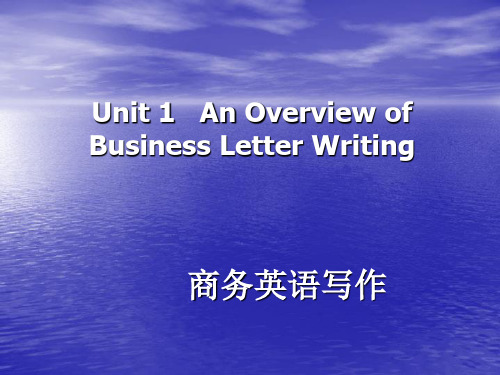
Complicated/general vs Simple/concrete
Interrogate Subsequent ቤተ መጻሕፍቲ ባይዱo With regard to Institute Be kind enough Under date of Soon A large volume Contact you
4. Please indicate your
choice of color…
Correctness
• Correct grammar, punctuation and spelling
are basic requirements for business writing, In addition, correctness means choosing the correct level of language, and using accurate information and data.
a boss
✓Positive
Informal or rude Be superior Use implicit words Accuse readers Use demanding tones Negative
Compare the following:
• This letter is to inform • Since you are our
you of an important
regular customer, we
change in our policy
are writing to let you
concerning insurance know about our
• We’ve received your
商务英语阅读 unit 1
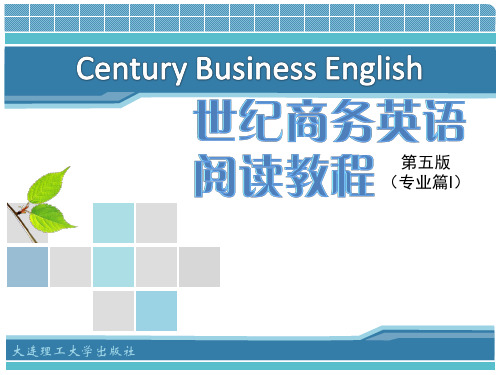
A. 营销策略 B. 营销组合 C. 营销计划 D. 市场细分 E. 目标市场 F. 顾客忠诚 G. 市场调查 H. 分销渠道 I. 促销编码 J. 公共关系
Comprehensive Reading
Text : A
Marketing Mix What does the word marketing mean? Marketing is the ongoing process of moving people closer to making a decision to purchase, use, follow or conform to someone else’s products, services or values. Marketers can use the variables of marketing mix[1] to devise a marketing plan. There are the standard four marketing mix (4Ps) and the extended three marketing mix (3Ps) in marketing. The 4Ps can be defined as the blend of product, pricing, promotion, and place or distribution channel[2] that satisfies the demands of the chosen market segment[3]. The 3Ps refer to the three elements of people, process and physical evidence[4]. 4Ps The standard four Ps have to fit closely together, and the key to effective marketing is the ability to adjust each of the four factors in response to the demands of the target market[5].
商务英语阅读 Unit 1 International Business

3.Sቤተ መጻሕፍቲ ባይዱbsidye
4.Quota 5.NTB
8.specific duty
9.Tariff 10.tariff rate quota
a
a grant paid by a government to an enterprise that benefits the public
b c
d e
tax figured as a percentage on the value of goods
non tariff barrier
Quotas permitting a stipulated amount of goods to enter the nation duty-free or at a low rate, while charging a much higher duty for subsequent imports when the amount is reached.
• 3 .Specific rate duty :A specific rate duty is a tariff levied on imports, defined in terms of a specific amount per unit, such as cents per kilogram. By contrast, an ad valorem duty is a charge levied on imports defined in terms of a fixed percentage of value. • 4. Tariff-rate quota: A tariff-rate quota (TRQ) is a trade policy tool used to protect a domestically-produced commodity or product from competitive imports. • 5 .Economic efficiency: In economics, the term economic efficiency refers to the use of resources so as to maximize the production of goods and services. An economic system is said to be more efficient than another (in relative terms) if it can provide more goods and services for society without using more resources In absolute terms, a situation can be called economically efficient.
商务英语写作unit 1

Conclusion
To expect an answer
to expect no answer
9.1Opening
9.1.1 Thanks for receiving a letter
delegations(10%)
Correspondence / Communication in writing ☺ 函:Business letters ☺ 电:Telegrams, telexes, faxes & E-mails
3.The nature & goal of the course
☺ Nature - An English course combining international trade with English.
☺ Goal - To cultivate the ability of negotiating international trade in English, especially in English correspondence.
1) Sender’s name: China National Light Industrial Products Import & Export Corporation, Shanghai Branch
2) Sender’s address: 198 Hunan Road, Shanghai, China 3) Sender’s E mail: shanghai @hotmail 4) Sender’s telephone number: 86 21 66231198 5) Sender’s fax number: 86 21 24317579 6) Sender’s website: slihgc 7) Date: June 23, 2004 8) Receiver’s name: Messrs Jameson & Sons Ltd. 9) Receiver’s address: 34 Madison Square, Melbourne, Australia 10)Salutation: Dear Sirs
高级商务英语文本UNIT1
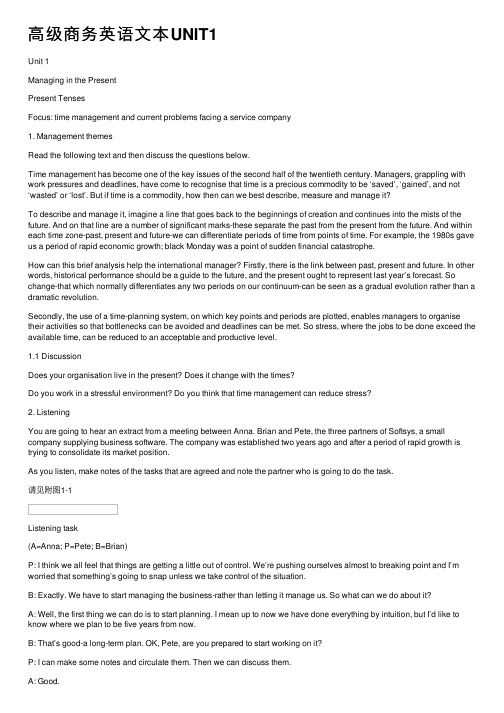
⾼级商务英语⽂本UNIT1Unit 1Managing in the PresentPresent TensesFocus: time management and current problems facing a service company1. Management themesRead the following text and then discuss the questions below.Time management has become one of the key issues of the second half of the twentieth century. Managers, grappling with work pressures and deadlines, have come to recognise that time is a precious commodity to be ‘saved’, ‘gained’, and not‘wasted’ or ‘lost’. But if time is a commodity, how then can we best describe, measure and manage it?To describe and manage it, imagine a line that goes back to the beginnings of creation and continues into the mists of the future. And on that line are a number of significant marks-these separate the past from the present from the future. And within each time zone-past, present and future-we can differentiate periods of time from points of time. For example, the 1980s gave us a period of rapid economic growth; black Monday was a point of sudden financial catastrophe.How can this brief analysis help the international manager? Firstly, there is the link between past, present and future. In other words, historical performance should be a guide to the future, and the present ought to represent last year’s forecast. So change-that which normally differentiates any two periods on our continuum-can be seen as a gradual evolution rather than a dramatic revolution.Secondly, the use of a time-planning system, on which key points and periods are plotted, enables managers to organise their activities so that bottlenecks can be avoided and deadlines can be met. So stress, where the jobs to be done exceed the available time, can be reduced to an acceptable and productive level.1.1 DiscussionDoes your organisation live in the present? Does it change with the times?Do you work in a stressful environment? Do you think that time management can reduce stress?2. ListeningYou are going to hear an extract from a meeting between Anna. Brian and Pete, the three partners of Softsys, a small company supplying business software. The company was established two years ago and after a period of rapid growth is trying to consolidate its market position.As you listen, make notes of the tasks that are agreed and note the partner who is going to do the task.请见附图1-1Listening task(A=Anna; P=Pete; B=Brian)P: I think we all feel that things are getting a little out of control. We’re pushing ourselves almost to breaking point and I’m worried that something’s going to snap unless we take control of the situation.B: Exactly. We have to start managing the business-rather than letting it manage us. So what can we do about it?A: Well, the first thing we can do is to start planning. I mean up to now we have done everything by intuition, but I’d like to know where we plan to be five years from now.B: That’s good-a long-term plan. OK, Pete, are you prepared to start working on it?P: I can make some notes and circulate them. Then we can discuss them.P: Fine.A: Now what about roles? I mean I know that we each have got our own specialist functions within the organisation and that we also function pretty well as a team, but perhaps we need a leader.P: Y ou mean like a managing director?B: Y es, but I thought our philosophy was to keep a flat management structure.A: Yes, I accept that we don’t want to create a hierarchy, but I still think that it can help us if we choose a managing partner who has overall control.P: Yes, I really don’t think that will harm the relationship between us and I agree that it can help us to run the company more efficiently.B: Well, I am not totally convinced, but I’m willing to be persuaded. As you two are keen on the idea, why don’t you prepare a paper about what the management structure would be and the functions of the managing partner?A: Well, I’d like to have a go at that. I’ll prepare some notes and circulate them. Then we can discuss them at our next meeting. If that’s OK with you, Brian?P: Yeah, fine by me.B: Well, we’ve talked about planning and managing. Now, what about improving the organisation? I think we need to look at how we can organise ourselves better.A: Well, having a managing partner should help.B: Of course, but we need to look at our own roles, too.P: To identify areas of responsibility?B: Y es, first the areas where each of us has the main responsibility and then the areas where we are involved, but not primarily responsible. Take purchasing, for example. We need to buy in goods-everything from machines down to plugs. We buy in machines when a customer has placed an order and then we check cashflow and consult the others. But we buy the smaller items without any consultation.A: Oh, come on, we always discuss major purchases and the minor ones are made when we need to. We can’t consult with each other for every bit of cable we buy.B: I know we can’t. But that’s exactly why we need one person with responsibility for authorising purchases. Then we can consistently check where we can get the best value for money by putting one person in charge. And that person can reconcile the purchases made against the invoices that come in. It’s simply a matter of streamlining the system-which must be in everyone’s interest.A: So, what do you suggest?B: Well, I think we should each make a list of the major functions within the organisation. We’ve talked about purchasing. Then there’s sales and after-sales service...P: ... and finance.B: Yes, and installation. Well, I’d like to see one person with primary responsibility for each area, just as we said for purchasing. And the others may have secondary responsibility for that area. So, I propose that I draw up a list of the primary areas or activities that we need to carry out, and then at the next meeting we decide who will have the primary responsibility for each. I’m sure it’ll streamline our business.A: So, where does that leave us?P: With some homework to do and some key issues to discuss at our next meeting. By the way, when are we meeting?A: Well, let’s say that...1.本课主题阅读下⾯这篇由⼀位“商业医⽣”撰写的⽂章并就列出的问题进⾏讨论。
Unit 1中级商务英语阅读

Text A Is Your English Too English?English may be the language of international business but as Alison Thomas reports, it’s not only non-native speakers who need to learn how to use it effectively. Ask a Swedish Ericsson executive “Talar du Svenska?” and he may well reply“ Yes. But only at home. At work I speak English.” Ericsson is one of a growing number of European companies that use English as their official corporate language. These companies recognize and at the same time increase the dominance of English as the language of international communication. Soon the number of speakers of English as a second language will exceed that of native English speakers.Although a company might use English as its official language, its employees are unlikely to be bilingual. Language trainer, Jacquie Reid, thinks we consistently overestimate the fluency of non-native speakers. “We always assume that their language skills are as good as ours, so they understand everything we say.”So how should we adapt our use of language and what are common problems. “Simplify it” is Reid’s advice. “Don’t over-complicate the message. Reduce what you’re saying to manageable chunks.” Reid always tells people to limit themselves to one idea per sentence. “It’s also important to s low down and not to raise your voice.”Dr. Jasmine Patel, a language consultant at Europhone, says different languages also have their own approaches to dialogue. “The British start with idiomatic expressions such as So, should we get down to it? And they understate important issues with phrases such as there could be a slight problem. They also say That’s a good idea, but... when they mean No and they repeatedly use the word get with different meanings. And worst of all they insist on using humour which is so culture-specific that no one understands it.”The majority of English native speakers are insensitive to the stress of trying to understand a foreign language in a work environment because they rely on the business world speaking their language. At Ericsson, however, this is not the case. At the UK subsidiary, Ericsson Telecommunications, management training courses include seminars on both language and cross-cultural issues.A frequent comment made in follow-up evaluations is that increased awareness has improved communication and more importantly given participants a better understanding of their own language and how others might interpret it.Task 1At the very beginning of this unit, you’ve learned the techniques ofguessing the meaning of unfamiliar words from context clues. Read Text A and choose the most probable meaning for the following words, and explain the clues.1. exceed (Para. 2, Line 7):A. to be fewer thanB. to be greater thanC. to be better qualified than2. over-complicate (Para. 4, Line 3):A. to make something easyB. to make something short and clearC. to make something too difficult to deal with3. understate (Para. 5, Line 4) :A. to emphasize a statement, fact, or ideaB. to describe something in a way that makes it seem less important than it really isC. to say something in a strong way4. seminar (Para. 6, Line 5) :A. ClassB. eventC. promotion5. improve (Para. 6, Line 7) :A. to make something difficultB. to make something less importantC. to make something betterTask 2Choose the best answer for each of the following questions according to Text A.1.What may “Talar du Svenska” mean?A. Do you speak Swedish?B. Do you speak English?C. Can you speak English?D. Do you use a computer?2. Why do many companies use English as their official corporate language?A. The employees can only speak English.B. They want to do business with native English speakers.C. The number of speakers of English is large.D. English is the dominant language in international business.3. Jacquie Reid suggests native speakers adapt their use of language and givethe following advices except that .A. they should raise their voice and speak loudlyB. they should speak slowlyC. they should use simple languageD. they should express one idea in one sentence4.Which of the following statements is NOT true?A. A foreigner may not understand the humour used by the British.B. The British tend not to say No when they mean No.C. Most British understand foreigner’s difficulty in using English.D. It’s advisable to speak simple sentences to non-native Englishspeakers.5. What do the British really mean when they say “That’s a good idea, but...”?A. They do think it’s a good idea.B. They reluctantly agree with you.C. They don’t think it’s a good idea.D. They want to discuss the idea with you.6. At the Ericsson Telecommunications,A. seminars on language is included in management training courses in that managers can’t speak EnglishB. seminars on language and cultural issues prove to be useful.C. participants of the seminars have learnt how to interpret other languageD..participants of the seminars are evaluated to see if they have improved their communication skills7. What is the main idea of the passage?A. More and more people throughout the world will learn to speak English.B. People will learn to speak English better to communicate with nativespeakers.C. Effective business communication depends on good understanding ofboth language and culture.D. It’s necessary to learn English grammar we ll.Task 3: Complete the following sentences with the correct form of the words in brackets.1. A successful company must be to the changing business environment.(adapt)2. Nowadays businesses have to be able to compete . (international)3. She didn’t want to work for a large where everything was soimpersonal. (corporate)4. He has won wide in the field of telecommunication technology.(recognize)5. The manager is , and you can just talk to him if you want to take part in the project. (approach)6. A lot of people make the that poverty does not exist in the developed countries. (assume)7. In my a lot of other banks are going to have the same problem. (estimate)8. We need to set up a committee to deal with Public Relations Crisis. (consult)Task 4Fill in the blanks with the words given below. Change the form where necessary.Interpret bilingual subsidiary idiomatic issueunderstate exceed evaluation consistently employee1. The results of the competition our expectations.2. The author tried to a difficult problem in a simple way to the readers.3. The company was sold according to the of its assets.4. They exaggerated the enemy’s losses and their own.5. Her work is sometimes good, but the problem is she’s not .6.The company is operated by a young manager appointed by the board of directors.7. Canada is a(n) country where two languages are used officially.8. He had the ability to write fluent and English.9. The number of in the company has trebled over the past decade.10.They have published a lot of new books on international .Text B Who Needs English?After years of slogging through her English lessons stumbling over pronunciations and baffling rules of grammar, Kim Chang Eun came up with a better idea.The 33-year-old science teacher switched to Chinese.It wasn’t that the language was easier. But studying Chinese felt like a warm homecoming, a return to a familiar culture and way of thinking. China has exerted great influence on most of Korea’s recorded history and many aspects of the Korean language and culture—from chopsticks to the Confucian family structure—are derived from China.Although South Koreans have their own alphabet they often use Chinese characters for names and in newspapers. Besides, with China on its way to surpassing the United States as South Korea’s largest trading partner, she figured its language would be more advantageous in landing a job in the business world.“When America was the leader of the world we all studied English”, Kim said“Now that China is rising to the top, the interest is swaying toward the Chinese language.” In the last two years, half a dozen private Chinese schools have opened in downtown Seoul and posters for new ones are plastered throughout the subway system.In December, prestigious Seoul National University announced that Chinese had replaced English as the most popular major among liberal arts students. The country’s largest electronics companies recently started offering free Chinese lessons for their employees in anticipation of expanded operations in China. Since 2000, the number of South Koreans studying in China has more than doubled. There were 35,000 as of the end of 2005, making South Koreans the largest nationality of foreign students in China. Meanwhile the number taking the entry exam for Chinese universities has increased threefold according to the Chinese Embassy in Seoul.“People are sending their teenagers to China to learn Chinese. They are really crazy about China,” said Nam Yong Sook , an economist with the South Korea Institute for International Economic Policy. “After all the hype about En glish now everybody wants to learn Chinese.”For South Koreans, the simple fact of the matter is that China is much closer and much bigger than the U.S. Both countries have maintained close economic connection since the diplomatic relation was established.In 2005, China surpassed the United States as South Korea’s largest export market. Bilateral trade between China and South Korea was worth $63.2 billion last year and is expected to reach $100 billion within the next year or two, according to the Chinese Embassy in Seoul.Yang Houlon, Deputy Chief of Mission at the embassy, said “China’s economy is growing, so demand for Chinese speakers is increasing. China and Korea share a lot of common ground. It is easy for us to communicate.”Test 5 Read Text B again and decide whether the following statements are True or False.1.Kim Chang Eun quit learning English and switched to Chinese because Chinese is easier to learn.2. Historically speaking, Korea had been greatly influenced by Chinese culture.3. China has become Korea’s largest trading partner.4. Studying Chinese is becoming popular throughout Asia.5. Chinese has become the most popular major in Seoul National University.6. By the end of 2005, there were 35,000 Korean students studying in China.7. China is becoming more important to South Korean economy and is playing an important role in influencing North Korean behavior, which lead to South Korean favorable sentiment toward China.8. The United States was South Korea’s largest export market in 2005. Practical Reading : English Training IntroductionNantong Dynamic English Training Center was set up by the famous Australian scholar Dongmo Zhang, aiming at meeting the thirst for learning English of some white-collars, successful people and those who have a strong interest in learning English.Our teaching method combines guided multi-media teaching with private classes which have explicit aims towards individuals. Lessons that have specific aims are combined with other lessons in order to help students gain a working knowledge of the English language quickly. Our students’ results prove that our method is both efficient and can be taught to a diverse group of people. Studying is hard but interesting. We believe that with our efforts and your cooperation, you will soon feel the joy of success.Features of Dynamic Training1. Flexible Study Time: Students can decide their own study time according to their own schedule.2. Individual Paced Structure: Students can follow the ir own learning “rhythm” and maintain a steady pace in their language development.3. Teaching Pattern Centered on Students: Students are the center of the class, while teachers act as assistants.4. High Technology Combined with Foreign Teachers With the most advanced multi-media teaching equipment and native foreign teachers, we provide students with English learning environment.5. Personalized Progress Reports: We will carefully m onitor each student’s progress followed by a tutor. Then a periodic report will be generated to show students progress.6. A Real Life Environment: Our private classes, expansion classes, salons and extra curricular activities provide students an ideal environment for learning and using the English language .Students learn how to think in English rather than mechanically translating words, sentences and expressions from Chinese.Q:1. What is the objective of Dynamic English Training?2. What is the feature of its teaching method?3. What is the aim of the combination of different types of lessons?4. What are the characteristics of Dynamic training?5. How does the center provide the students with a real life environment?。
- 1、下载文档前请自行甄别文档内容的完整性,平台不提供额外的编辑、内容补充、找答案等附加服务。
- 2、"仅部分预览"的文档,不可在线预览部分如存在完整性等问题,可反馈申请退款(可完整预览的文档不适用该条件!)。
- 3、如文档侵犯您的权益,请联系客服反馈,我们会尽快为您处理(人工客服工作时间:9:00-18:30)。
Messrs, Kato & Co., Ltd 2 Nichome, Ginza Nishi
Chuo--ku, Tokyo
1.4. The Salutation
Here are some ways to write the salutation.
Dear Sirs/Gentlemen —— to a company Dear Sir Dear Madam Dear Mr Smith Dear Mrs Smith Dear Miss Smith Dear Ms Smith Dear John —— to a man if you do not know his name —— to a woman if you do not know her —— to a man —— to a married woman —— to an unmarried woman —— to a married or unmarried woman —— to a friend or someone you know well
Conciseness (2)
• • • •
Avoiding repetition of words in a same sentence. e.g.: — ―Please quote your lowest price for your best quality.‖ for ―Please quote your best price for your best quality.‖
Conciseness means
• All the words/sentences and paragraphs in a letter must be clear cut and straight forward. Three aspects should be paid attention to:
Fax: 4455666
1.2. Date
There are different ways of writing the date. The following two are recommended.
September 15, 1994 15 September 1994 (Note the Omission of the comma)
(1) To an individual in a company
Mr. George F. Moore Advertising Manager Price & Patterson 234 Seventh Avenue New York 5, New York U.S.A.
1.3. The Inside Address (封内地址) Examples of the inside address:
Style Very Formal Formal Salutation My dear Sir/ Madam, Dear Sir/ Madam, Gentlemen/Sirs, Dear Mr./Mrs. Satterby, Complimentary Closes Respectfully/Respectfully yours, Yours truly, Yours faithfully, (British usage) Sincerely yours, (American usage) Cordially, Best regards, (British usage)
• 4. Requirements for writing business letters Good command of English Knowledge of business theory and practice Knowledge of technical terms Knowledge of psychology Skills in salesmanship
Correspondence / Communication in writing 函:Business letters 电:Telegrams, telexes, e nature & goal of the course Nature - An English course combining international trade with English. Goal - To cultivate the ability of negotiating international trade in English, especially in English correspondence.
1.2. Date Sample:
SKYVIEW ENTERPRISES 7111 Terrazo Place Sarasota, Fl 33031 (813)598 – 1026 January 20, 1995
1.3. The Inside Address (封内地址) Examples of the inside address:
Courtesy means
– Being very polite, even in asking the addressee to pay back the debts or refusing his demands.
– Being prompt in replying to the opposite party’s letter.
• 2.Why should we learn the course?
Ways to finalize international trade: i. Correspondence (80%) ii. Fairs & Exhibition (10%) iii. Mutual visits by trade delegations(10%)
1.5. The Body
The body of the letter is the message that the writer has to convey to the recipient.
1.6. The Closing
Notice the following chart, which gives the appropriate complimentary close to use with various salutations.
•5. Seven guidelines of writing business letters- 7Cs Clarity Conciseness Courtesy Correctness Concreteness Consideration completeness
Clarity means
and (h) any added notations(注释).
1.1. Heading (信头) Sample:
Golden Trading Company Ltd. 34 Northern Avenue, New York, U.S.A.
Tel: 1234567
Telex: 2345667GBC
1. Structural Parts of Business Letters
A business letter has eight structural parts: (a)
the heading (letter-head )(信头), (b) the date(日
期 ), (c) the inside address( 封 内 地 址 ), (d) the salutation(称呼), (e) the body of the letter(正文), (f) the complimentary close(结尾谦称 ), (g) the signature (handwritten and then typed)( 签 名 ),
Less Formal
Personal Dear Mr./Mrs. Grimshaw, (Implying personal Dear John, relation.)
1.7. Signature
•
The signature is the signed name or mark of the person who writes the letter or the firm which he or she represents. It is written in ink immediately below the complimentary close. • To sign with a rubber stamp is a form of discourtesy.
introduction
• 1.What is a business letter? The letter is a common business communication medium. The most effective letters are messages from real people to other real people. Business letters should develop goodwill is a principle of vital significance. Letter-writing is an essential part of business. The letter is often evidence of a contract.
Unit 1
Structural Parts and Styles of Business Letters
Objectives:
To give a brief introduction to structural parts and styles of business letters To enable you to become aware of structural parts and styles of business letters To do exercises to familiarize the structural parts and styles of business letters
